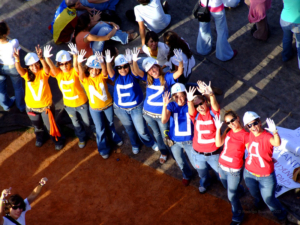Fragility and the Rule of Law in Venezuela
 At the heart of the crisis in Venezuela lies a deeper catastrophe: the collapse of the rule of law. Once a country of relative prosperity, Venezuela is now a fragile state where institutions no longer serve citizens, particularly people experiencing poverty. In 2024, Venezuela’s gross domestic product (GDP) per capita was $4,000, one of the lowest in Latin America.
At the heart of the crisis in Venezuela lies a deeper catastrophe: the collapse of the rule of law. Once a country of relative prosperity, Venezuela is now a fragile state where institutions no longer serve citizens, particularly people experiencing poverty. In 2024, Venezuela’s gross domestic product (GDP) per capita was $4,000, one of the lowest in Latin America.
The country also experienced one of the world’s highest inflation rates, rising consumer prices significantly. The consequences are not confined to its borders. From mass migration to regional instability, Venezuela’s collapse is a global poverty issue that cannot be ignored.
A Broken Justice System
Venezuela currently ranks last in the World Justice Project’s Rule of Law Index. According to the index, courts are politicized, the judiciary lacks independence and fundamental rights are routinely violated. Dissent is punished with arbitrary detention and torture and legal protections for the vulnerable have all but disappeared.
For those already living in poverty, this legal collapse is devastating. Without functioning institutions, workers can be exploited without recourse, communities lack public services and corruption goes unchecked. When the rule of law fails, poverty becomes entrenched.
A Regime That Fuels Poverty
The regime of President Nicolás Maduro has overseen the dismantling of democratic institutions and the collapse of the economy. Transparency International consistently ranks Venezuela among the most corrupt nations globally. Public resources are diverted to elites while health care, education and infrastructure are neglected.
Inflation reached 400% in 2023 and more than 80% of Venezuelans now live below the poverty line, according to the World Bank. The most impoverished households struggle to obtain food, medicine and clean water. This crisis is not just economic; it is political. The government’s refusal to allow reform or accountability sustains the systems that keep people poor. Aid efforts are often obstructed and humanitarian organizations face restrictions on their work.
The fallout from Venezuela’s collapse has sparked the second-largest migration crisis in the world after Syria. As of 2024, more than 7.7 million Venezuelans have left the country for safety and opportunity. Many have settled in neighboring countries like Colombia, Ecuador and Peru, where strained public systems struggle to accommodate them. This mass migration creates new poverty challenges in host communities, from overburdened schools to job market competition.
Migrants face their own vulnerabilities: exploitation, xenophobia and legal uncertainty. The crisis extends beyond borders, affecting the whole region and highlighting how fragile governance contributes to global poverty. Venezuela’s case reveals a broader truth: poverty thrives where the rule of law fails. Without functioning legal systems, enforcing labor rights, distributing aid effectively or combating corruption is impossible.
Final Remarks
Despite the repression, civil society organizations inside and outside Venezuela continue to document abuses, offer legal aid and support democratic movements. International watchdogs like Human Rights Watch and Amnesty International advocate for accountability. At the same time, diaspora-led groups aid migrants and lobby for policy change. These efforts are limited but vital. They keep the possibility of reform alive and help protect the rights of the most vulnerable.
– Charlie Baker
Charlie is based in London, UK and focuses on Politics for The Borgen Project.
Photo: Flickr
